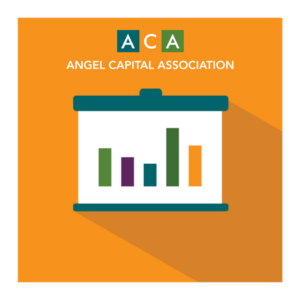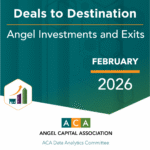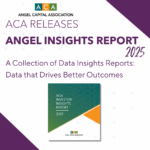 Few would dispute that we are in the midst of a cyclical downturn in the early-stage funding cycle. Exit and IPO activity have dropped precipitously, and funding has declined across the board. This is normal as shown in TCA Venture Group’s funding history since 1997:
Few would dispute that we are in the midst of a cyclical downturn in the early-stage funding cycle. Exit and IPO activity have dropped precipitously, and funding has declined across the board. This is normal as shown in TCA Venture Group’s funding history since 1997:

Note: NuFund Venture Group was formerly TCA-San Diego prior to 2022
Source: TCA Venture Group Annual Report
What is NOT normal is that valuations for early-stage funding rounds have remained stubbornly high, even though valuations in later stage funding have dropped dramaticall

Source: Carta, Ron Weissman
To understand this elevation in earliest stage deal valuations, let’s look at longer trends going back to 2016. In that year 18% of valuations of TCA funded companies were in the $1-3 million range, but by 2023 this dropped to only 3%. Also in 2016, valuations in the $3-6 million range comprised 42% of funding, yet by 2023 that has dropped to 10%. The recent data from ACA for all Angel Groups shows a similar recent pattern, with only 7% in the $1-3 million range and 12% in the 3-6 million range:

Source: TCA Venture Group, Angel Capital Association Angel Funders Report
There are of course higher valuations (as expected) in Series A compared to Seed/Pre-Seed, and dispersion in each stage. For TCA VG, the dispersion is increasing in the later stage deals, mostly because some of those deals are companies that TCA VG have found attractive for their fundamentals rather than “hype” in certain verticals:

Source: TCA Venture Group Annual Report
ACA’s data on all angel groups show similar valuations in each stage, except for the Series B and higher category (which may be due to a greater mix of later stage companies):

Source: TCA Venture Group Annual Report, Angel Capital Association Angel Funders Report
In 2023, TCA VG did not see much difference in medians for new vs follow-on rounds. This is partly due to follow-ons often being priced close to previous rounds in order to attract funding in this tough market:

Source: TCA Venture Group Annual Report
So why have valuations of early stage stayed stubbornly high, rather than retreating to levels more akin to previous down cycles? Here are some possible explanations:
- There is still too much money chasing deals. During this past upcycle, many micro VCs raised significant funds and pursued earlier stage deals in earnest. Their DNA was wrapped up in a VC mindset that starting valuations were less important given the lofty later stage valuations and frothiness at that end of the market (hence over 1000 “unicorns” today vs only 8 in 2008 and 1 in 2001). Those micro VC funds need to be invested or they will have to return the capital, hence valuations are bid up.
- Angel groups typically have 10-20% member turnover each year, so that many of the angels negotiating terms today weren’t active in 2016 and hence think a $10 million valuation is “normal”. There may not be enough institutional memory to bring more discipline to negotiations over valuation. Sometimes young associates in law firms and “mentors” in incubators whose “experience” is the last 5 deals they have seen sagely tell the founder that “$13 million is what their company is worth.”
- Crowdfunding continues to be an active alternative funding source, and investors using those websites have no control over valuation which is often set by the early-stage CEO without much negotiation. FOMO compels many angels to accept these high valuations
- Compounding this, there seems to be a feedback loop wherein inexperienced founders and investors can compound the problem in a non-virtuous cycle: crowdfunding platforms set unrealistically high valuations, investors don’t understand the issues and cannot negotiate anyway, so the deals get done and then they become benchmarks or peer data points that affect founders in regular rounds who set valuations high and newer less experienced investors sign up for it and the self-reinforcing cycle repeats.
- Early-stage valuations are least impacted by short term trends – many view it as a long game, and hope that exits valuations will rebound by the time an exit becomes a reality
- We have returned to a Darwinian mode, where some deals are hotly competed, and investors actually give them more money and higher valuations to reward them for their comparative competence. Those valuations pull the overall early-stage market up.
- Some of the higher than expected valuations may be due to a mix of AI funding where the valuations in the past two years have been as elevated as overall valuations were in 2021
Regardless of the causes, the consequences of these elevated early-stage valuations are potentially significant, and even disastrous.
These high initial valuations can destroy companies when a company cannot grow into its post-money from its previously overvalued round. Early professional investors are not the only people hurt – in fact, because early investors often have anti-dilution protection or caps or discounts, it is the founders and friends and family investors who are hurt the worst, and the consequences can be fatal to a company – the founders’ economics deteriorate to the point that it is not worth it to keep going. Moreover, disenchanted investors can scare later investors away, and momentum is lost. Deals become shopworn trying to raise and founders take their eye off the ball in terms of the business while struggling to raise money. Eventually a crisis point arrives and the company either fails, or does a toxic emergency round before going on to inevitably fail. It is a story we’ve seen too many times from our front row seat at TCA VG. Much could have been avoided had the company started out at a lower valuation.
As evidence of the tougher funding environment, recent analysis from Carta shows that it is much harder for companies to progress to Series A funding, and some of this is because of the too high valuations of seed rounds:

Source: Carta Data Minute Insight
KEY TAKEAWAYS
- Early-stage valuations remain stubbornly high – higher than is usual during a “downcycle” such as we are experiencing today
- The implications can be disastrous for both founders and investors
- Investors should have a frank conversation about valuations with early-stage CEOs, articulate the risk of being underfunded as a result of insistence on valuations that are historically high
- Without a rebound in IPO activity and exits in general, returns from this class of earl- stage companies may disappoint relative to historical returns
AUTHOR:
- John Harbison, Chairman Emeritus of Tech Coast Angels and ACA Board Member






